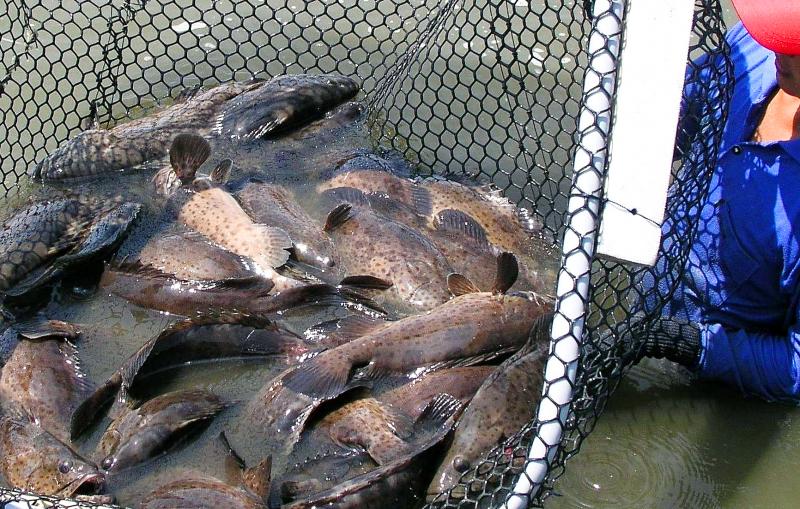Two fish farms in Pingtung County are being examined after Chinese authorities announced that they had found residue of illegal veterinary drugs in imported Taiwanese live groupers, Council of Agriculture (COA) officials said on Thursday.
The Chinese General Administration of Customs on Thursday last week issued a notice saying that it had found malachite green and crystal violet, which are banned for use in aquaculture in China, in live groupers imported from two fish farms owned by Wang Chih-yi (王志義) and Tai Chao-chung (戴兆鐘).
Chinese authorities said that they had suspended imports of fish from the two farms until further notice and would step up inspections of fish from other Taiwanese operations.

Photo: Lee Li-fa, Taipei Times
The suspension was confirmed by COA Deputy Minister Huang Chin-cheng (黃金城), who added that the council had temporarily suspended permits allowing the two farms to export live groupers to China as Taiwanese authorities look into the matter.
The Mainland Affairs Council said that Chinese customs notified Taiwanese animal quarantine authorities of the issue on Monday last week and asked that exports from the two farms to China be stopped while an investigation is conducted.
Exports of live groupers to China from other Taiwanese operations remain normal, Huang said.
Before the COVID-19 pandemic, Taiwan exported approximately 12,000 tonnes of live groupers to China annually, Fisheries Agency data showed.
However, due to logistics disruptions amid the pandemic, only 6,021 tonnes were exported to China in the first 11 months of last year, the data showed.
Following the notice from Chinese customs, Pingtung County Government officials on Thursday took samples from the two farms, Bureau of Animal and Plant Health Inspection and Quarantine Deputy Director-General Hsu Jung-ping (徐榮彬) said.
The bureau would consider further action after test results come back, Hsu said.
Malachite green is a synthetic dye that was once widely used in aquaculture as an antifungal agent, Hsu said.
It was banned in Taiwan after studies indicated that it might be carcinogenic.
Taiwan does not regulate the use of crystal violet because it is not commonly used in the industry, he said.
The Fisheries Agency inspects fish products before they are loaded on ships to be exported, said Lin Kuo-ping (林國平), the agency’s deputy director-general.
There are six licensed vessels that carry live fish to China, Lin said.
Wang said that he did not know how his fish could have been contaminated, as he had samples tested before sending a shipment to China in early November.
Wang, whose family has worked in the industry for more than six decades, said that he hopes a third-party inspector re-examines the fish.
Tai said he was told that a shipment of fish belonging to him was stopped at the Chinese border in October, but he had not shipped any groupers at that time.
Tai said he suspected someone might have exported the fish using his name, adding that he had reported the matter to the local authorities.
He said that he does not rule out the possibility of legal action.

Taiwan is stepping up plans to create self-sufficient supply chains for combat drones and increase foreign orders from the US to counter China’s numerical superiority, a defense official said on Saturday. Commenting on condition of anonymity, the official said the nation’s armed forces are in agreement with US Admiral Samuel Paparo’s assessment that Taiwan’s military must be prepared to turn the nation’s waters into a “hellscape” for the Chinese People’s Liberation Army (PLA). Paparo, the commander of the US Indo-Pacific Command, reiterated the concept during a Congressional hearing in Washington on Wednesday. He first coined the term in a security conference last

Prosecutors today declined to say who was questioned regarding alleged forgery on petitions to recall Democratic Progressive Party (DPP) legislators, after Chinese-language media earlier reported that members of the Chinese Nationalist Party (KMT) Youth League were brought in for questioning. The Ministry of Justice Investigation Bureau confirmed that two people had been questioned, but did not disclose any further information about the ongoing investigation. KMT Youth League members Lee Hsiao-liang (李孝亮) and Liu Szu-yin (劉思吟) — who are leading the effort to recall DPP caucus chief executive Rosalia Wu (吳思瑤) and Legislator Wu Pei-yi (吳沛憶) — both posted on Facebook saying: “I

The Ministry of Economic Affairs has fined Taobao NT$1.2 million (US$36,912) for advertisements that exceed its approved business scope, requiring the Chinese e-commerce platform to make corrections in the first half of this year or its license may be revoked. Lawmakers have called for stricter enforcement of Chinese e-commerce platforms and measures to prevent China from laundering its goods through Taiwan in response to US President Donald Trump’s heavy tariffs on China. The Legislative Yuan’s Finance Committee met today to discuss policies to prevent China from dumping goods in Taiwan, inviting government agencies to report. Democratic Progressive Party Legislator Kuo Kuo-wen (郭國文) said

The Ministry of Economic Affairs has fined Taobao NT$1.2 million (US$36,900) for advertisements that exceeded its approved business scope and ordered the Chinese e-commerce platform to make corrections in the first half of this year or its license would be revoked. Lawmakers have called for stricter supervision of Chinese e-commerce platforms and more stringent measures to prevent China from laundering its goods through Taiwan as US President Donald Trump’s administration cracks down on origin laundering. The legislature’s Finance Committee yesterday met to discuss policies to prevent China from dumping goods in Taiwan, inviting government agencies to report on the matter. Democratic Progressive Party